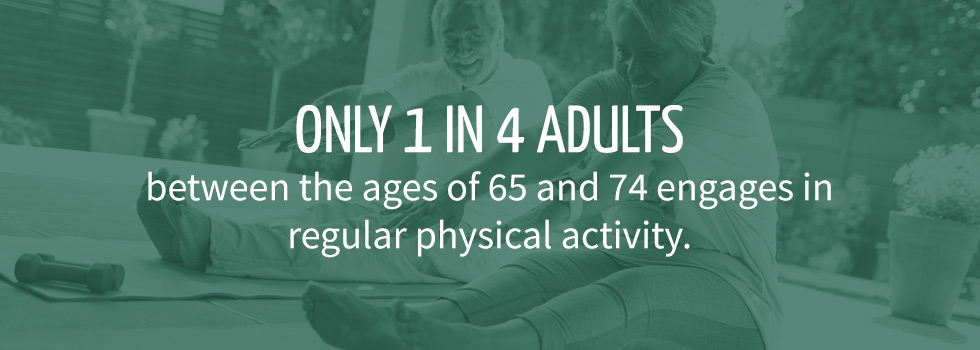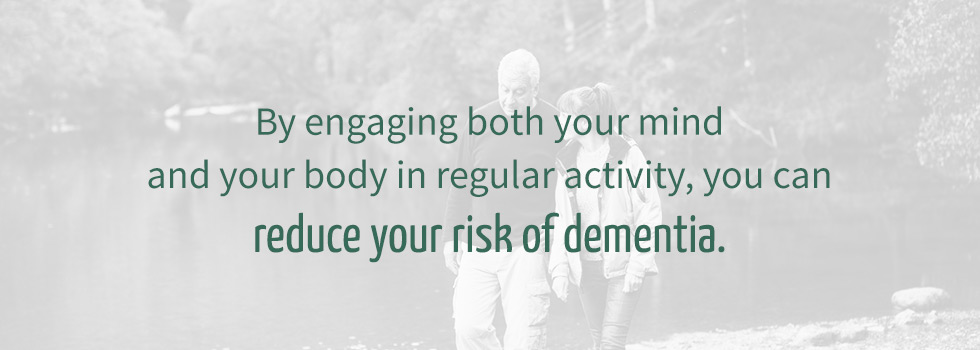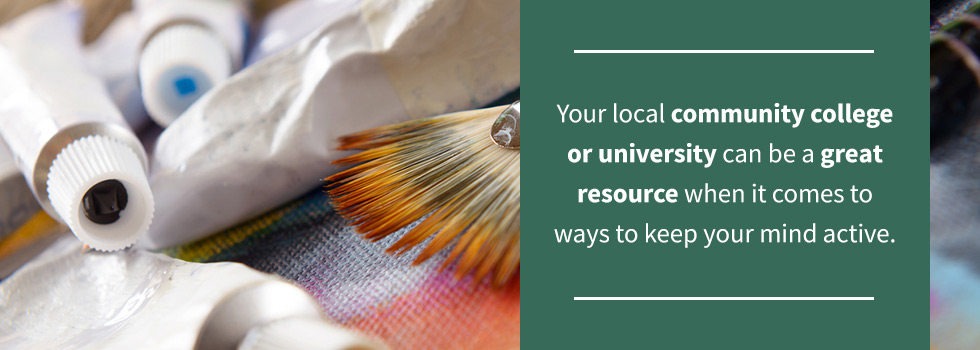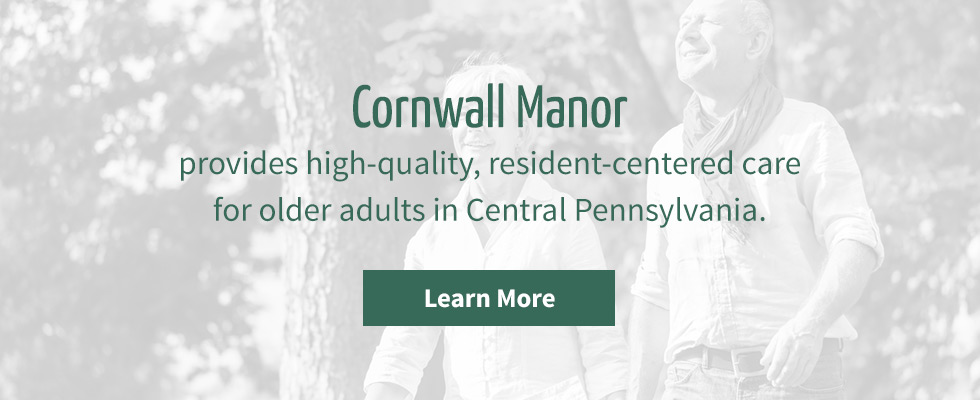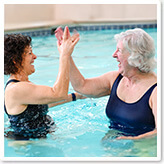Only one in four adults between the ages of 65 and 74 engages in regular physical activity. After age 75, only one in three men and one in two women will engage in regular physical and fun activity. Some rule out physical activity because of a medical condition or event. Others mistakenly believe they are too old to be active. And others believe that they are too out of shape to make changes later in life.
Explore Cornwall Manor’s Health & Wellness Activities
Why Staying Active is Important for Aging Parents
While each person is different, the truth is that many of the behaviors and physical or mobility issues you associate with aging may actually be due, in large part, to a lack of physical and mental activity. When a person chooses not to stay active in either or both of these areas, the result can be a decline in stamina and strength, as well as mental capacity. Even in cases where a mental or physical health condition is not related to inactivity, becoming more active can provide a means of managing and, in many cases, even improving symptoms.
It is true that adults begin to slow down as they age, but there is no reason to believe that inactivity is a natural part of the aging process. What’s important for aging adults and their families to remember is that activity will look different as time goes on. Among adults over age 65, the most popular physical activities are gardening, walking and yard work. While these activities may not include running races or weight training — although many active older adults still do these things — they are still important because they help aging adults stay healthier longer.
Health Benefits of Staying Active for Aging Parents
Ongoing physical and mental activity helps adults to stay healthier longer and provides many other benefits, including:
1. Reducing the Risk of Many Serious Health Conditions
By staying active, older adults reduce their risk of high blood pressure and coronary heart disease which may be apart of their family history. For adults already coping with these conditions, physical activity can be beneficial in managing symptoms and even improving an individual’s overall health. Exercising three hours a week can increase your lifespan by five years.
2. Reducing the Risk of Falling
Falls can lead to broken bones, as well as a variety of other serious injuries. A regular exercise routine and physical activity keeps adults stronger and helps with balance, making them less likely to fall.
3. Maintaining Healthy Joints, Bones and Muscles
Physical activity is especially beneficial to individuals who have arthritis because it helps to control the swelling and pain associated with it. While it can be difficult to be motivated to be active when you’re in so much pain, studies have shown that movement does reduce pain levels and improve joint function. Even for a person who has not been diagnosed with arthritis, physical activity can help with managing and reducing aches and pains of all kinds. It can also help protect your bones against the spread of osteoporosis.
4. Reducing the Occurrence of Depression and Anxiety
Regular activity of all types has been shown to improve an individual’s mood and overall feelings of well-being. By engaging both your mind and your body in regular activity, you can also reduce your risk of dementia. Health aside, one of the best things you can do to stay mentally fit as you age is to try new things. You can do this by signing up for a class to learn a new skill, joining a social group to meet new people or playing games with loved ones.
5. Improving Mental Health and Capacity
Regular physical activity helps to keep your body operating at its peak physical ability and improves your memory and brain function. One study found that physical activity improved brain volume in adults ages 60 to 79. As your body ages, it does lose brain volume, so any activity that can increase your brain volume — and ultimately your memory and cognitive abilities — is beneficial.
Explore Cornwall Manor’s Health & Wellness Activities
How To Talk To Aging Parents
When parents age and their children become the family caregivers, providing advice and recommendations to your parents can be awkward. There are many topics to discuss with parents like ‘when to stop driving,’ ‘talking with the doctor about health changes,’ and ‘what senior options are available for mom and dad.’ Discussing the benefits of staying physically and mentally active is not one of the more difficult discussion topics.
Here are some tips on discussing mental and physical activity with your parent(s).
1. Approach the Topic With Research
Approach and discuss the topic and have research to support your claim (whether it is a family doctor or internet-based information from a reputable source). Offer suggestions on how to incorporate more physical and mental activity. Is there a gym or fitness center that offers classes specifically for older adults? What about a senior center that has activities and programs specifically designed for seniors. Is there a retired group of people in the neighborhood that could start a walking club? Can a puzzle app be downloaded to a tablet or computer?
2. Be Respectful
Even though you may be adapting to a role reversal, they are still your parents. If you opt to approach your parents with several other people — such as your siblings — make sure your parents sit in the middle of the group and not on the outskirts. This will help avoid the temptation to talk around them instead of talking to them.
3. Listen: Allow Your Parents To Respond
Once you’ve shared the benefits of staying physically and mentally active, allow your parents to respond. Don’t interrupt them, even if they seem to be struggling to find the right words to communicate with you.
4. Provide Time and Space to Process
Allow them the time and space to process and share their thoughts in the same respectful way you shared yours with them. As they share, take the time to think about things from their point of view.
5. Ensure Family Members Are Kept Up-To-Date
While there will most likely be one person who takes the lead in caring for your aging parents, most families have several siblings who all want to be involved in some way. Make sure that everyone is kept up-to-date on your parents and given a chance to contribute when possible. There will always be differences of opinion and occasional disagreements over the best way to care for your parents, but staying calm and keeping everyone informed is a helpful way toward easing tensions and hurt feelings. If your family is spread out and it isn’t possible to get together to talk, consider using conference calls and email to keep everyone informed.
6. Work Through Challenges Together
Sometimes in situations like this, parents and children can become overwhelmed with all of the changes that are taking place. Just like you are worried about your parents’ health and well-being, your parents are dealing with changes they are experiencing. Take a deep breath and work through these challenges together. Find opportunities to spend time with your parents without having serious conversations.
Suggested Mental and Physical Exercises for Aging Loved Ones
As adults grow older, they face a different set of health challenges, including physical and mental changes. Five percent of older adults will find themselves facing dementia — a term used to classify many memory-loss conditions, including Alzheimer’s disease. Additionally, 6.5 million older adults will struggle with depression.
It can be difficult to know how to prevent mental or physical challenges as you age. It isn’t always possible to avoid them. However, there are things you can do to keep your mind and body active.
1. Seek out Friends
Whether you are continuing established friendships or meeting new people, staying connected with people and placing yourself in social situations will keep you active and involved, which are good benefits for the mind and body. Make a point to call friends on the phone or join a book club or a class at your local YMCA or community center. Living in a active retirement community offers friendships and activities to keep you engaged.
2. Stay Connected to Family
Keeping in touch with family is beneficial – even if distance is a factor. Advances in technology can help keep us in touch with friends and loved ones through the use of email, Facebook or FaceTime.
3. Stay Physically Active
Activities like Tai Chi, swimming, yoga, weightlifting and water aerobics can all be great ways for older adults to stay in shape, but you don’t need a gym membership to stay active. Take a walk with a friend, do yard work, opt for the stairs over an elevator when you can — all of these are ways to incorporate daily movement into your life. Have trouble getting around? No problem. You can still be active too. Try out chair exercises or engage in household chores to keep yourself busy and moving as many muscles as you can.
4. Take a Class
Your local community college or university can be a great resource when it comes to ways to keep your mind active. Love to read? Take a literature class. Always had an interest in the stars? Opt for an astronomy class. Many schools also offer lectures, seminars and other opportunities to pursue an interest or hobby at little-to-no cost. If you’re unable to leave your home, consider taking an online class. Many online classes still provide some interaction with other people, as well as in-depth content that will engage and challenge your mind. If you don’t want an academic-based class, seek out a local class on painting, photography, gardening or something else that interests you.
5. Adopt a Pet
Animals can lessen depression in older adults, as well as help them be less agitated and more socially engaged. If an aging parent is not in a position to adopt or care for an animal, many animal shelters need volunteers to walk dogs or read to cats.
6. Look for Ways to Help Others
One of the best things you can do for your mental and physical health at any age is to volunteer your time and talents with an organization that you support. Volunteering gives you a reason to get out of the house on a regular basis and can provide pleasure and purpose which will improve your daily outlook. Helping someone in need has even been shown to lessen symptoms of depression. If you are homebound, you can still find ways to be involved in causes you believe in. It may just take a bit more effort to make it happen. Use the Internet or talk with other people you know to find ways you can help from the comfort of your own home.
7. Explore or Revisit a Spiritual Connection
Involvement in a religious community can help you connect with other adults, as well as give you opportunities to find purpose and give back to others.
8. Engage With Technology
These days, technology can help older adults stay connected by providing opportunities to video chat with loved ones, taking an online class or learning a new skill through a YouTube tutorial. You can email back and forth with old friends or even chat via one of the many web-based messenger systems available. Sharing videos and photos can also help you feel more connected to your family and friends who are far away.
9. Have Some Fun
Whether you sit down with a crossword puzzle or host weekly card games, look for opportunities to play cards, games and solve puzzles whenever you can. Sudoku, jigsaw puzzles and even board games are all great ways to keep your mind sharp. And, if you find games that require at least two people, you’ll also be spending time socializing too.
Explore Cornwall Manor’s Health & Wellness Activities
Learn More About Staying Active at Cornwall Manor
As you age, your mind and body can change. Change is hard both for the adult who is growing older, as well as their family members. The nice thing about many of the activities listed above is that they can be done together with loved ones, neighbors or friends. Playing games, attending a community concert, taking a walk or simply talking on the phone are all ways to stay connected.
Providing health services and housing for older adults for nearly seventy years, Cornwall Manor provides high-quality, resident-centered care in Central Pennsylvania. We are proud to be a not-for-profit community that our residents and their families can enjoy freedom from worry. Cornwall Manor’s benevolent care will continue to provide housing, programs and care if a resident depletes their resources over time. We invite you to visit us and see why Cornwall Manor continues to be named the best in our region for senior living services. Contact us today to set up your tour.


